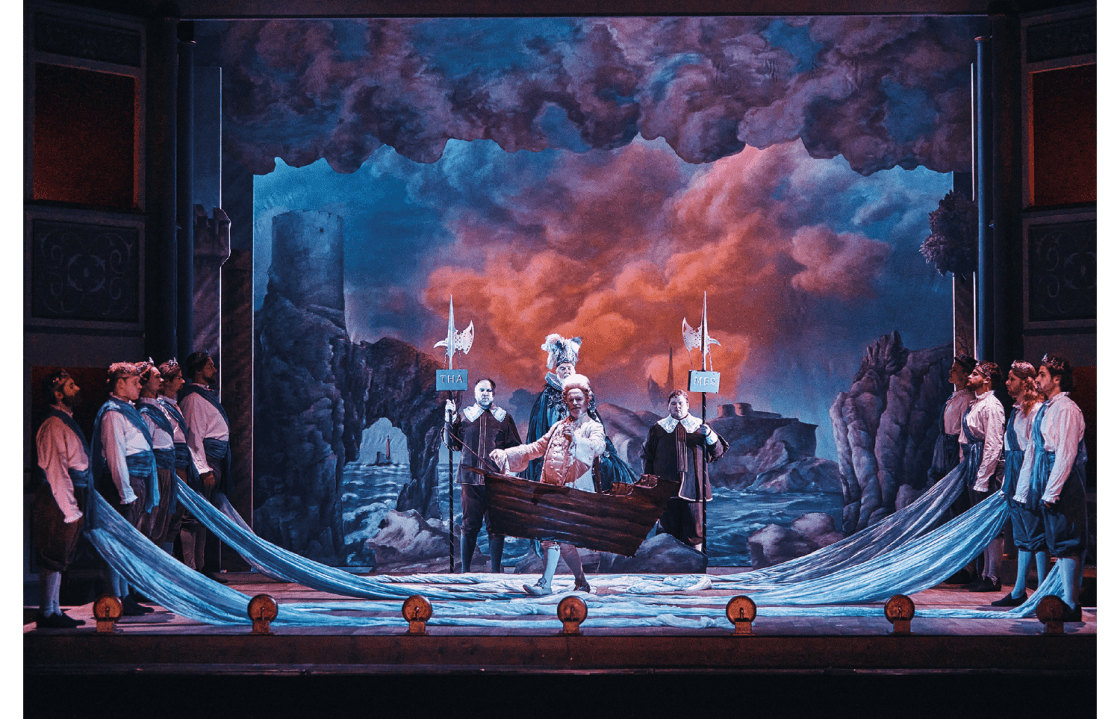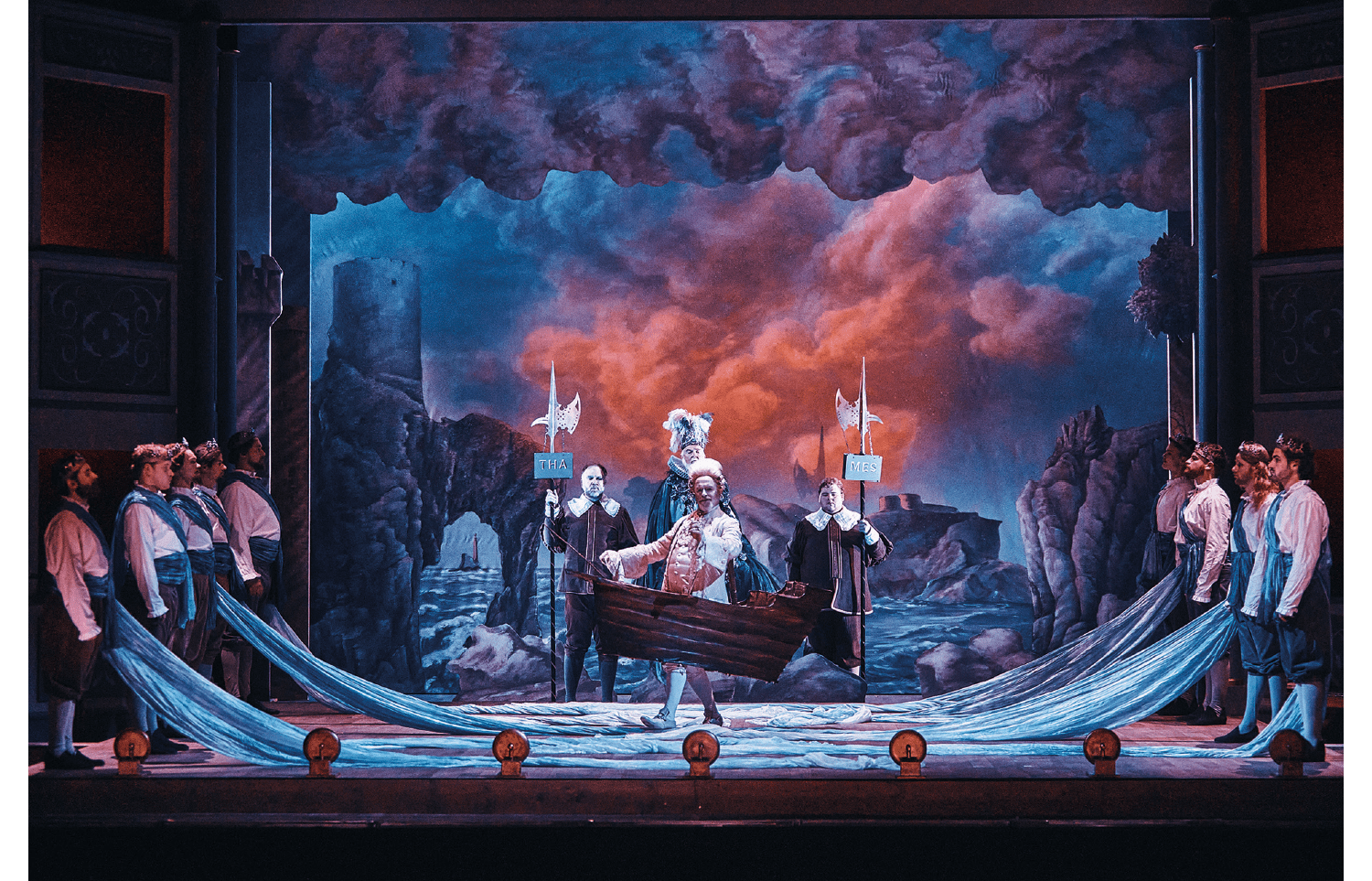‘Theatre within Theatre’ was the theme of the 2024 Wexford Festival and with Sir Charles Villiers Stanford’s The Critic, that’s exactly what you get. Conor Hanratty’s production showed the interior of an 18th-century theatre, viewed from the stage. In the second act it flipped around to reveal the audience’s perspective. Were we now the audience? Clearly we were; which was awkward because where does that leave a critic? Obviously, one can’t be the critic because there’s already one on stage (the clue’s in the title), and as it turns out, The Critic isn’t really about critics, at all. Whatever – you get the picture. It’s all very meta; and more than a bit silly.
Apparently the audience in Genoa booed Le maschere off stage, and they may have had a point
Stanford’s basic idea is simple enough. Sheridan’s backstage comedy is tweaked so that the playwright Puff is now an opera librettist, his associate Dangle is the composer and the critic Sneer (nothing if not subtle, old Richard Brinsley) is still a critic, sniping from the sidelines during a rehearsal of Puff and Dangle’s opera The Spanish Armada. They’re all spoken roles, and only the opera-within-the-play is actually sung. So there we all were: a 21st-century audience watching 18th-century characters commenting on an opera set in the Elizabethan age, sung to music – lovely, late-vintage Stanford – from the era of Elgar.
In practice, it worked a charm, and by staging it in 18th-century settings and costumes, Hanratty gave us space to puzzle it all out for ourselves. In some ways, The Critic is an opera with an inferiority complex – a rueful commentary on the Anglophone world’s enduring conviction that serious drama is spoken, not sung. The actors keep chuntering away, and the music is repeatedly interrupted so the three commentators can sharpen their wit, like a Georgian Beavis and Butthead.
The result was gently amusing (chuckles rather than belly laughs), and Stanford peppers his score with musical gags: a mad scene, an extended riff on Don Carlo and a burst of Beethoven’s Ninth when Puff plagiarises Othello. But for a genuine artist – and Stanford, at his best, was certainly that – insincerity is the hardest thing to fake. While we’re smiling at the grotesques on stage, the music begins to soar and swell – lyrical, bittersweet, and bathed in golden late-romantic orchestration. Ciaran McAuley cnducted, and after some early hiccups the orchestra really glowed.
Wexford rarely puts a foot wrong with casting and Mark Lambert (Puff), Jonathan White (Dangle) and Arthur Riordan (Sneer) were all suitably droll in their frock-coats and periwigs. The singers, meanwhile, never break character, though with voices of the calibre of Ben McAteer (Sir Walter Raleigh) and Ava Dodd (the geographically named heroine Tilburina) you didn’t really need much realism. Dane Suarez hammed it up splendidly as the comedy-Spaniard Don Whiskerandos, but the quality of his singing (he’s a proper can-belto Italianate tenor) was real enough.
It all ended with a pageant: dancers with galleons on their heads and Good Queen Bess gliding across waves of sea-blue silk. Utterly daft, for sure; but oddly beautiful too; and with those mocking voices finally silent, the orchestra (and Stanford) had the last word. In Hanratty’s staging, it was possible to see The Critic (like Strauss’s Ariadne) as a vindication of the power of music – and to take or leave the fact that this very Irish festival had just shown us a fiercely Unionist composer, in 1916, celebrating the most Protestant of British victories. Or maybe that’s overthinking it. Maybe it was all just a huge joke at the expense of people who take opera too seriously. Critics, for example. Bravo, Sir Charles. Chapeau, Mr Director. You got me.
The other main productions at Wexford this year were also operas about opera. Ryanair scuppered any chance of seeing Donizetti’s Le convenienze ed inconvenienze teatrali, which by all accounts was a gem. Mascagni’s Le maschere was a turkey. Written in 1901, it’s an Italian nationalist reboot of commedia dell’arte.
In some ways, The Critic is an opera with an inferiority complex
The traditional characters – Harlequin, Colombine and the rest – retain all their traditional attributes, so Mascagni doesn’t bother to give them musical personalities, and spools out yard upon yard of burbling landfill verismo. At one point the lover Florindo (Andrew Morstein) declares that he’s about to sing the ‘serenade of all serenades’, but he doesn’t. He really doesn’t.
As director, Stefano Ricci had one job – to differentiate the characters – and he botched it, updating the action to a modern health spa populated by indistinguishable randoms in business wear and bathrobes.
Francesco Cilluffo, conducting, did his best to make the score dance, and the cast and chorus sang handsomely (the soprano Lavinia Bini sounded particularly sweet in her role as Rosaura), but there was little to work with here, and lots of it. Apparently the audience at the Genoa première booed Le maschere off stage, and they may have had a point.








Comments